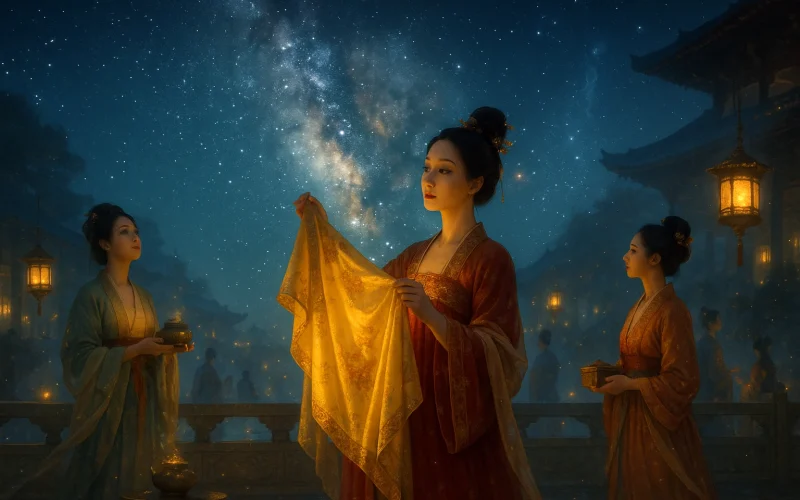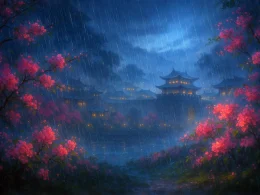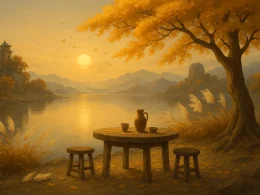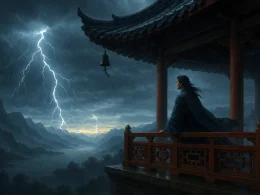Have you not seen in bygone days, by the Lake Eternal Spring,
The Pavilions of Royal Fragrance merged with clouds in a string?
Their lanterns’ glow and glare with Fairy Lanterns vie;
Their burning incense fumes aspire to reach the sky.
That night when stars were thick and the River shone bright,
People said the Weaving Maid would meet her Cowherd that night.
The palace maids were busy at the Robe-Airing Tower,
As at the celestial Court the fair Weaving Maid would show her power.
Where were the robes aired? In the yellow sunset ray;
The palace maids bore them in boxes of jade away.
They ran up the steps, their pearl-decked shoes to please,
Up and down the golden stairs, by the painted beams and the trees.
They saw the crimson River steam with blue smoke in the skies,
And on the painted screen two flowers and a crouching hare;
They saw four boys and coiling dragons hold the bed’s canopy fair.
Like clouds dispersed were unveiled the silken dresses bright,
Like stars came back the robes adorned with pearls and gems in light.
The morning rosy clouds seemed shy to see the robes on the stand;
The evening moon paled to show its light on the mirror less grand.
Some robes were embroidered with immortal birds of long, long life;
Some were adorned with fairies welcome as a sweetheart or wife.
The rooms with tortoise-shell screens witnessed a spring day;
The coral windows seemed to turn the night away.
Favored in golden chamber and pepper-scented walls,
The arrogant, spoiled maidens would not answer outside calls.
The emperor should think of the cost of the terrace high;
Why not burn the fur coat as did the emperor long gone by?
Original Poem
「七夕曝衣篇」
沈佺期
君不见昔日宜春太液边,披香画阁与天连。
灯火灼烁九微映,香气氛氲百和然。
此夜星繁河正白,人传织女牵牛客。
宫中扰扰曝衣楼,天上娥娥红粉席。
曝衣何许曛半黄,宫中彩女提玉箱。
珠履奔腾上兰砌,金梯宛转出梅梁。
绛河里,碧烟上,双花伏兔画屏风,四子盘龙擎斗帐。
舒罗散縠云雾开,缀玉垂珠星汉回。
朝霞散彩羞衣架,晚月分光劣镜台。
上有仙人长命绺,中看玉女迎欢绣。
玳瑁帘中别作春,珊瑚窗里翻成昼。
椒房金屋宠新流,意气骄奢不自由。
汉文宜惜露台费,晋武须焚前殿裘。
Interpretation
This poem was composed during the reign of Empress Wu Zetian or Emperor Zhongzong of Tang. The Qixi Festival (Double Seventh Festival) held significant ceremonial importance in the Tang court, representing a major celebration for women. The palace featured "Clothes-Airing Towers," where on Qixi night, palace maidens displayed silken garments under the moonlight, symbolizing prayers for blessings and skill. However, Shen Quanqi's poem not only depicts the festival's splendor but also embeds criticism within praise, using lavish language to describe grandeur while subtly warning against excess through cool undertones.
First Couplet: "君不见昔日宜春太液边,披香画阁与天连。"
Jūn bùjiàn xīrì Yíchūn Tàiyì biān, pī xiāng huà gé yǔ tiān lián.
Have you not seen, by the former Yichun Garden and Taiye Pool,
The perfumed pavilions seem to touch the sky?
Second Couplet: "灯火灼烁九微映,香气氛氲百和然。"
Dēnghuǒ zhuóshuò jiǔ wēi yìng, xiāngqì fēn yūn bǎi hé rán.
Lanterns blaze like the Nine Luminaries shining bright,
A hundred blended perfumes mingle in the air.
The opening uses "have you not seen" to evoke a grand, historical perspective, directly immersing the reader in the imperial splendor of "former" times. Yichun Garden and Taiye Pool, both royal parks, symbolize extreme luxury. The repetitive phrasing of "blaze" and "mingle" constructs a visually resplendent space, while also hinting at illusion—the extravagant scene "touching the sky" is but a mortal dream.
Third Couplet: "此夜星繁河正白,人传织女牵牛客。"
Cǐ yè xīng fán hé zhèng bái, rén chuán Zhīnǚ Qiānniú kè.
This night, stars abound, the River of Stars shines white,
People say the Weaving Maid and Cowherd meet.
Fourth Couplet: "宫中扰扰曝衣楼,天上娥娥红粉席。"
Gōng zhōng rǎorǎo pù yī lóu, tiān shàng é é hóngfěn xí.
In the palace, the clothes-airing towers bustle with life,
As if celestial maidens feast on rosy mats above.
The poet juxtaposes "celestial" and "palace," overlaying the folk legend of Qixi with the court's celebration to create an "earthly paradise" illusion. The poem blends romantic festival atmosphere with subtle unease and irony: the palace maidens' "rosy mats" represent worldly desires, yet are compared to a "celestial banquet," revealing a disruption between human order and natural harmony.
Fifth Couplet: "曝衣何许曛半黄,宫中彩女提玉箱。"
Pù yī hé xǔ xūn bàn huáng, gōng zhōng cǎi nǚ tí yù xiāng.
As twilight yellows the air for clothes-airing,
Palace maidens carry jade boxes in the court.
Sixth Couplet: "珠履奔腾上兰砌,金梯宛转出梅梁。"
Zhū lǚ bēnténg shàng lán qì, jīn tī wǎnzhuǎn chū méi liáng.
Pearl-adorned shoes rush up orchid-carved steps,
Golden stairs wind past plum-blossom beams.
This section details the clothes-airing ceremony with intricate brushwork. "Twilight yellows" suggests the lighting of lamps at dusk, while "jade boxes," "pearl-adorned shoes," and "golden stairs" pile up visual and auditory opulence. Shen Quanqi's diction peaks here, yet words like "rush" and "wind" reveal restless undertones—hinting at emptiness beneath the splendor.
Seventh Couplet: "绛河里,碧烟上,双花伏兔画屏风,四子盘龙擎斗帐。"
Jiàng hé lǐ, bì yān shàng, shuāng huā fú tù huà píngfēng, sì zǐ pán lóng qíng dǒu zhàng.
Under the Crimson River, through azure smoke,
Twin flowers and crouching hares adorn the screen,
Four dragons coil, upholding the canopy.
Eighth Couplet: "舒罗散縠云雾开,缀玉垂珠星汉回。"
Shū luó sàn hú yúnwù kāi, zhuì yù chuí zhū xīnghàn huí.
Silken gauze unfolds like parting clouds,
Jade and pearls dangle like the Milky Way.
This passage employs extreme opulence to depict the Qixi spectacle. The poet mirrors the "Milky Way" with "silken gauze" and "jade," making the earthly scene an illusory celestial palace. However, fleeting images like "clouds" and "smoke" subtly imply the hidden worry of prosperity preceding decline.
Ninth Couplet: "朝霞散彩羞衣架,晚月分光劣镜台。"
Zhāoxiá sàn cǎi xiū yījià, wǎn yuè fēn guāng liè jìngtái.
Dawn's glow outshines the clothes racks in shame,
The evening moon pales against the mirror stand.
Tenth Couplet: "上有仙人长命绺,中看玉女迎欢绣。"
Shàng yǒu xiānrén chángmìng liǔ, zhōng kàn yùnǚ yíng huān xiù.
Above, immortals wear long-life ribbons,
Below, jade maidens greet joy in embroidered robes.
This section blends dream and reality, portraying the earthly scene as surpassing the celestial. The words "shame" and "pales" are ironically used—excessive luxury dims even natural brilliance.
Eleventh Couplet: "玳瑁帘中别作春,珊瑚窗里翻成昼。"
Dàimào lián zhōng bié zuò chūn, shānhú chuāng lǐ fān chéng zhòu.
Behind tortoiseshell blinds, spring is remade,
Through coral windows, night turns to day.
Twelfth Couplet: "椒房金屋宠新流,意气骄奢不自由。"
Jiāo fáng jīn wū chǒng xīn liú, yìqì jiāoshē bù zìyóu.
In peppered rooms and golden houses, new favorites bask,
Their pride and luxury know no bounds.
Here, the poem shifts from description to admonition. Shen Quanqi uses "spring remade" and "night turns to day" to depict the palace's endless extravagance, culminating in "luxury knows no bounds"—a profound, subtle revelation of the traps of favor and desire.
Final Couplet: "汉文宜惜露台费,晋武须焚前殿裘。"
Hàn wén yí xī lùtái fèi, Jìn wǔ xū fén qiándiàn qiú.
Emperor Wen of Han valued thrift, sparing the Terrace cost,
Emperor Wu of Jin burned his front-hall fur robe in remorse.
The concluding couplet uses history as mirror, embedding criticism in allusion. Emperor Wen of Han exemplified frugality, dismantling a terrace to avoid waste; Emperor Wu of Jin burned his luxurious robe as repentance. Shen Quanqi ends thus, satirizing the court's indulgence and neglect of moderation, leaving a thought-provoking message.
Holistic Appreciation
The poem transitions from splendor to decline, from lavishness to criticism. The first half elaborates on the Qixi spectacle with gorgeous diction and grandeur; the second abruptly turns to irony, warning against extravagance. Writing as a court poet, Shen Quanqi crafts a supremely luxurious surface while hiding caution beneath, giving the work dual layers: it is both a record of court celebration and a political allegory.
His technique inherits the capital-poetry tradition of Lu Zhaolin and Luo Binwang but achieves greater maturity and critical depth. By contrasting "bustling palace" with "celestial maids," the poet reveals the illusion and peril of human excess, constructing an artistic world that is "resplendent yet cold."
Artistic Merits
- Parallel Elaboration and Criticism: Uses lavish language to depict court grandeur while embedding political satire within extreme beauty.
- Layered Progression: Moves from palace grounds → festival → figures → admonition, with advancing plot and shifting momentum.
- Rich Imagery, Ornate Language: Interweaves silk, pearls, the Milky Way, and azure smoke for dual visual and symbolic beauty.
- Historical Allusion as Mirror: Reflects Tang extravagance through Han and Jin examples, with subtle depth.
- Balance of Reason and Emotion: Combines sensory richness with rational clarity, marking court poetry's shift toward realism.
Insights
This work, while superficially extolling prosperity, masterfully employs aesthetic sublimity to critique the perils of extravagance. It reveals that artistic brilliance without restraint ultimately succumbs to vanity, just as unrestrained power inevitably courts disaster. Shen Quanqi's poetic record of a single night's splendor simultaneously sounds a warning for the entire civilization. The dazzling lamps and shimmering pearls symbolize the flame of human desire—resplendent yet transient. By concluding with Emperor Wen's frugality, the poet offers both historical homage and contemporary counsel: true enduring beauty resides not in ornate palaces, but in virtuous restraint and spiritual clarity.
About the Poet
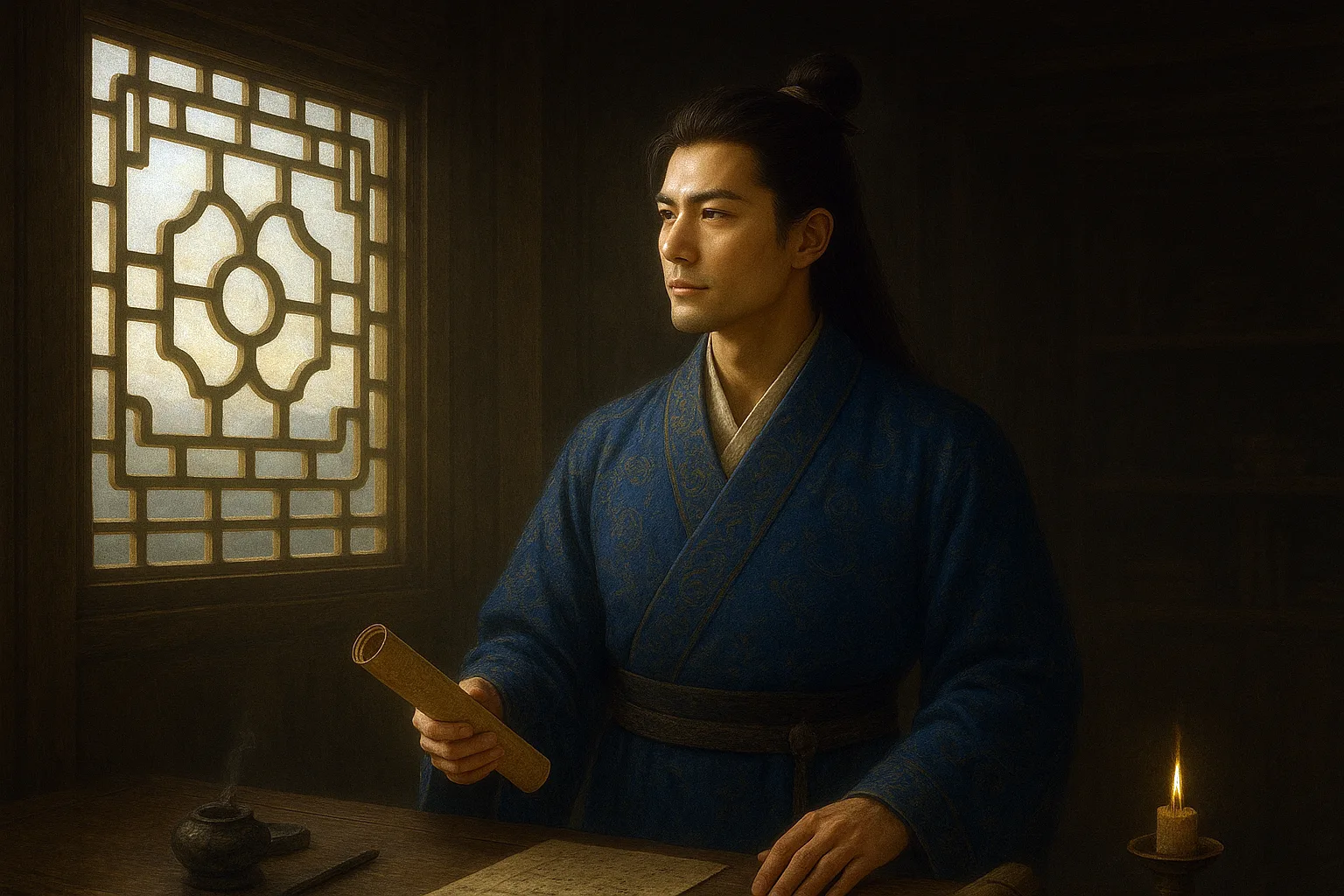
Shen Quanqi (沈佺期 c. 656–715), courtesy name Yunqing, was a native of Neihuang in Henan Province and an important poet of the early Tang Dynasty. Along with Song Zhiwen, he was renowned as one of the "Shen-Song" duo, whose work played a decisive role in finalizing the form of the five-character regulated verse (wuyan lüshi) in Tang poetry. His poems often include courtly compositions and travel-themed reflections, characterized by refined elegance and structural rigor. Shen was particularly skilled in the seven-character regulated verse (qilü), and his writing marks a transition from the lingering style of the Six Dynasties to the flourishing era of High Tang poetry. His contributions hold milestone significance in the development of modern-style verse (jintishi).






